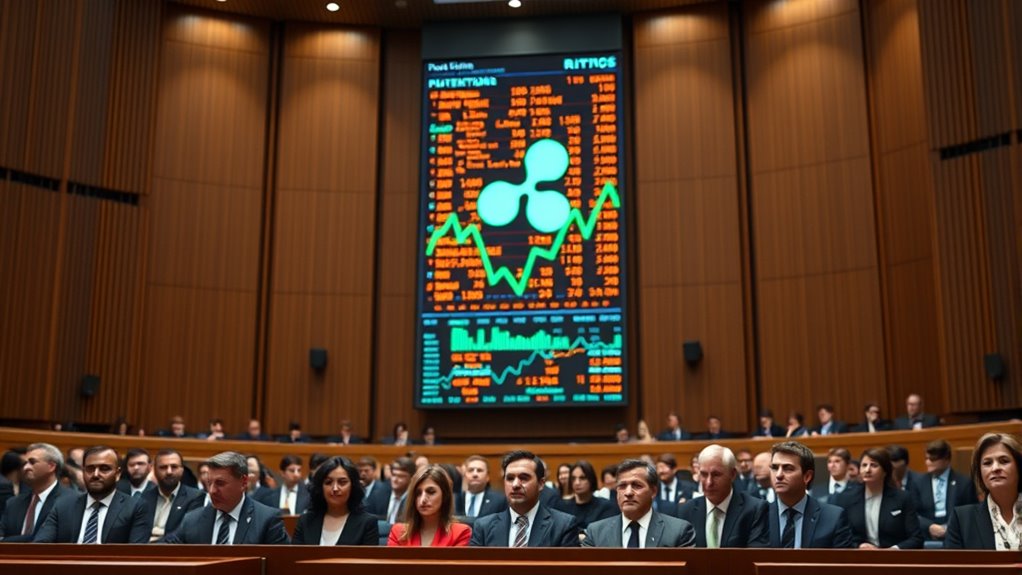Ripple’s win clarifies that how a digital asset is sold affects its classification as a security. If you buy from exchanges, it’s less likely to be a security, but private institutional sales remain more scrutinized. This sets a legal precedent that transaction methods matter more than asset features. As a result, industry players gain clearer rules, reducing overreach. To understand how this may impact other altcoins and future regulations, continue exploring the details.
Key Takeaways
- Ripple’s court victory clarifies that secondary market XRP sales on exchanges are not securities, supporting similar altcoin trading.
- It emphasizes that sale method and recipient type, not token design, determine whether a digital asset is classified as a security.
- The ruling provides a legal framework for altcoin projects to defend against broad securities classifications.
- Industry players can leverage this precedent to focus on transaction structures rather than token features.
- The decision encourages clearer regulation, promoting market stability and confidence for altcoin development and adoption.
The Ripple Case: A Landmark Legal Decision

The Ripple case marks a significant milestone in cryptocurrency regulation by establishing a clear legal distinction between different types of digital asset sales. You now see that XRP sales on exchanges aren’t securities, thanks to the court’s ruling. However, sales directly to institutional investors, especially those made to sophisticated buyers, are classified as securities violations. This decision clarifies that the way a token is sold, not just what it is, determines its legal status. The case sets a precedent that limits the SEC’s ability to broadly categorize tokens as securities, focusing instead on transaction structure. For you, this ruling offers more certainty about the legal landscape and creates a foundation for defending other digital assets against securities claims. It’s a pivotal moment for the industry’s future. Video Tutorial
Clarifying Securities Status for Digital Assets

The Ripple case clarifies that trading digital assets on exchanges isn’t considered a security, providing more certainty for market participants. It also shows that institutional sales to sophisticated investors can still be deemed securities, depending on how they’re conducted. Ultimately, the way transactions are structured plays a key role in determining a token’s regulatory status. Additionally, understanding retail hours for related services can be useful for investors seeking support or information during market hours.
Exchange Trading Not Securities
Since the Ripple case was decided, it’s become clear that how a digital asset is traded substantially influences its securities classification. The court ruled that XRP sold on exchanges to the public isn’t a security, emphasizing that secondary market trades don’t automatically count as securities offerings. This distinction clarifies that the method of sale matters more than the asset’s inherent properties. If you buy or sell XRP on an exchange, you’re likely engaging in a transaction that isn’t considered a security under current law. Additionally, essential oils for oral health are sometimes used to support overall wellness and reduce discomfort. However, direct sales to institutional investors or private placements still pose risks, as those can be classified as securities. This ruling offers clarity for traders and investors, focusing regulatory attention on transaction structure rather than the tokens themselves.
Institutional Sales as Securities
While trading XRP on exchanges to the public isn’t considered a security anymore, the court’s ruling clarifies that direct sales to institutional investors are a different matter. The ruling states that when Ripple sold XRP directly to sophisticated investors, those transactions qualified as securities offerings. This distinction is critical because it emphasizes that how a token is sold influences its legal status, not just the asset’s inherent nature. Institutional sales involved large sums, often with expectations of profit, meeting the criteria for securities. This sets a precedent that private, direct sales—especially to experienced investors—may require registration and compliance. Proper beneficiary designation is essential to avoid legal complications in future digital asset sales to institutions. As a result, future digital asset sales to institutions could face heightened regulatory scrutiny, impacting how projects structure their fundraising efforts.
Transaction Structure Matters
Understanding how a digital asset is sold can determine its legal classification more than the asset’s inherent features. The Ripple case clarifies that transaction structure influences whether a token is considered a security. For example, sales to retail on exchanges, where tokens are freely traded, are less likely to be securities. Conversely, direct sales to institutional investors or large-scale offerings may be viewed as securities due to the way they’re conducted. Key factors include:
- Sale method (public exchange vs. private offering)
- Recipient type (retail investor vs. institutional)
- Distribution process (standardized sale vs. customized deal)
- Token transfer conditions (immediate trading vs. restricted transfer)
These distinctions shape legal outcomes, emphasizing that the transaction’s design plays a pivotal role in a token’s classification.
How the Court Differentiated Between Retail and Institutional Sales

The court made a clear distinction between retail and institutional sales of XRP, emphasizing that the method of sale determines whether it’s a security. You learn that XRP sold on exchanges to retail investors isn’t classified as a security, because these transactions involve general, public trading. In contrast, direct sales to institutional investors or sophisticated buyers are deemed securities, as they involve private, negotiated transactions with specific investors. This differentiation hinges on how the sale occurs, not the asset itself. You now see that the court’s approach shifts focus from the token’s nature to the sale process. This ruling clarifies that retail market sales are less likely to be securities, while institutional sales carry higher legal risks, shaping future regulatory expectations. Additionally, understanding the concept of emotional alignment can help investors maintain a clear and positive perspective amidst evolving legal landscapes.
The Impact on Classifying Altcoins and Other Tokens

The Ripple case shifts how you can defend altcoins against SEC claims by emphasizing transaction structures over token types. With increased regulatory clarity, you now have a stronger foundation to argue that sales on exchanges are not securities. This ruling encourages a focus on how tokens are distributed, shaping future classification and enforcement strategies. Recognizing the importance of privacy and consent management in digital transactions can further support arguments that certain tokens do not meet securities criteria.
Stronger Defense Strategies
As the Ripple case concludes with a clear ruling that secondary market XRP sales aren’t securities, altcoin projects now have a more solid foundation for defending their tokens. This precedent shifts the focus from the token’s inherent qualities to how it’s sold and distributed. You can strengthen your legal defenses by emphasizing transaction structures that mirror Ripple’s ruling. Consider these strategies:
- Highlight secondary market sales to retail investors on exchanges.
- Demonstrate that your token is not sold directly to institutional investors as securities.
- Clarify that your offering involves ongoing secondary trading, not initial sales.
- Document the distribution method to show it aligns with non-security transactions.
- Incorporate various yoga techniques to promote mental clarity and focus during negotiations and legal strategy sessions.
This case provides a framework to challenge broad securities classifications, enabling you to craft more targeted, transaction-based defenses.
Transaction Structure Focus
The Ripple ruling indicates that how tokens are sold and distributed now plays a more significant role in their classification than their inherent properties. This means courts focus on transaction structure—whether tokens are sold directly to investors, through exchanges, or via institutional channels. For example, XRP’s sales on exchanges to the public are not securities, but institutional sales to sophisticated investors can be. This shift emphasizes that the method of distribution, rather than the token’s design, determines legal status. You should understand that similar tokens could be classified differently based on their sale methods. This focus encourages project teams to structure their offerings carefully, as the pathway of distribution influences regulatory outcomes more than the token’s technical features. Additionally, this approach aligns with the broader emphasis on transaction structure, which is crucial in the classification of tokens in various jurisdictions.
Regulatory Clarity Gains
Recent court rulings have substantially boosted clarity around how regulators classify digital assets, shifting focus toward transaction methods rather than just asset design. This shift helps you understand that how tokens are sold matters more than their label. The ruling sets a precedent that:
- Exchanges selling tokens to the public aren’t securities, reducing legal risks for platforms.
- Direct institutional sales remain high-risk if unregistered, highlighting the importance of sale structure.
- Secondary market transactions are less likely to be securities, easing regulatory concerns.
- Industry can cite this ruling as a benchmark, strengthening defenses in future disputes.
- Recognizing the importance of local legal resources can further influence the success of regulatory strategies.
These gains mean you’ll see clearer guidelines for token classification, giving investors and developers more confidence. It also prompts regulators to reconsider broad security designations, focusing more on transaction processes than the tokens’ labels.
Industry Reactions and Market Movements Following the Ruling

Following Ripple’s favorable court ruling, industry players and investors responded with a surge of optimism and renewed confidence. You saw XRP’s price jump by 4.5%, reflecting relief across the market. Companies in the crypto space expressed cautious optimism, viewing the decision as a step toward clearer regulatory boundaries. Investors became more willing to engage with altcoins, believing the legal landscape is shifting in their favor. Exchanges and institutional players announced plans to expand offerings and investments, citing reduced legal uncertainty. Meanwhile, some industry voices called for further clarity, emphasizing the importance of consistent regulations. Overall, the ruling prompted a rally of positive sentiment, encouraging development and adoption efforts. This moment marked a significant milestone, signaling that the industry might be entering a more stable, legally defined phase. Additionally, the ruling has underscored the importance of legal precedents in shaping future regulatory frameworks for digital assets.
Shifting Regulatory Perspectives and Future Enforcement Risks

As Ripple’s court victory signals a potential shift in how regulators approach digital assets, authorities may start reevaluating their enforcement strategies. You could see regulators becoming more cautious, focusing on transaction structures rather than broad token classifications. They might prioritize clarity to avoid legal ambiguities, which could lead to more targeted investigations. Enforcement risks may now hinge on:
- scrutinizing sales methods, especially direct institutional offerings
- differentiating between exchange trading and private sales
- avoiding blanket securities labels on all tokens
- adopting a more nuanced view of how assets are marketed and distributed
This shift might reduce overreach, encouraging innovation while maintaining oversight. However, regulatory agencies remain vigilant, and future actions could still target specific practices or token types, making ongoing compliance essential.
Limitations and Scope of the Legal Precedent in Other Jurisdictions

While Ripple’s legal victory sets an important precedent in the U.S., its influence on other jurisdictions remains limited. Many countries interpret securities laws differently, so Ripple’s ruling may not directly apply elsewhere. For example, jurisdictions like the EU or Japan have distinct frameworks for digital assets, often emphasizing investor protection over transaction structure. This variation means that the legal clarity gained in the U.S. might not translate globally.
| Country/Region | Approach to Crypto Securities | Impact of Ripple’s Ruling |
|---|---|---|
| European Union | Focus on investor protections, regulatory guidance evolving | Limited, may influence future amendments |
| Japan | Clear classification system, strong regulatory oversight | Minimal, different legal standards |
| United States | Case-specific, depends on transaction structure | Significant, sets a regional benchmark |
Ongoing Challenges and Areas Requiring Further Clarification

Despite Ripple’s legal victory, several ongoing challenges remain that require further clarification from regulators and courts. You need to understand that the legal landscape is still evolving, and many questions about how cryptocurrencies should be classified persist. For example:
Despite Ripple’s win, crypto classification and regulation remain uncertain and evolving.
- How will courts interpret the sale and distribution methods for other tokens?
- What specific criteria will define when a token is a security versus a commodity?
- Will future rulings extend Ripple’s precedent across different jurisdictions or only within the Southern District of NY?
- How regulators will adapt existing securities laws to address innovative crypto assets and transactions.
These uncertainties make it essential for industry participants to stay informed and adaptable, as legal standards could shift, impacting the broader crypto ecosystem and its regulatory future.
Strategic Implications for Crypto Projects and Investors

The Ripple legal victory markedly shifts the strategic landscape for crypto projects and investors by clarifying how certain sales and distribution methods are viewed under U.S. securities law. You now have a clearer framework to assess whether your token sales might face SEC scrutiny. Selling tokens on exchanges to the public appears safer, as these are unlikely to be classified as securities. However, direct sales to institutional investors still carry risks, especially if they resemble investment contracts. This ruling encourages projects to prioritize transparent, compliant distribution methods and avoid blanket assumptions about token classifications. For investors, it offers increased confidence in secondary trading, though caution remains around certain issuance strategies. Overall, this case sets a precedent that will guide future regulatory strategies and project planning efforts.
Frequently Asked Questions
How Binding Is the Ripple Ruling Outside the Southern District of New York?
The Ripple ruling mainly binds the Southern District of New York, so its legal impact outside that jurisdiction isn’t automatic. You should know that other courts might interpret similar cases differently, so the ruling isn’t a universal precedent. While it offers significant insights, future cases in different districts could set distinct standards. Stay cautious, as legal outcomes remain uncertain until higher courts address broader jurisdictional issues.
Could This Case Influence Future SEC Enforcement Actions Against Other Tokens?
Future SEC enforcement efforts could face formidable, firm footing thanks to Ripple’s recent ruling. This case clarifies that secondary market sales to the public aren’t securities, but direct, institutional sales are. You should expect regulators to scrutinize sale structures more strictly, targeting transactions and targeting tactics, rather than simply token types. This precedent prompts regulators to refine and reinforce their reach, encouraging industry insiders to innovate within clearer, more constrained confines.
Does This Ruling Affect How Other Countries Regulate Cryptocurrencies?
This ruling mainly affects U.S. regulations and doesn’t directly change how other countries regulate cryptocurrencies. However, it may influence international policymakers by highlighting the importance of transaction structure over asset type. You should watch how regulators in different regions adapt their rules, as some might use this case as a reference to refine their own crypto laws. Cross-border markets could see shifts in compliance strategies based on this precedent.
Will the Decision Impact Existing Altcoin Classifications or Only New Tokens?
This decision acts like a lighthouse guiding your journey through the turbulent seas of regulation, illuminating how existing altcoins are viewed. It mainly impacts new tokens and how they’re distributed, rather than rewriting the rules for all current altcoins. You can breathe easier, knowing that if your altcoin was sold on exchanges, it likely won’t face the same securities allegations. But stay alert—regulators still hold the brush to paint new rules.
What Specific Sale Methods Are Now Considered Securities in Future Cases?
In future cases, sales directly to institutional investors or large, sophisticated buyers are considered securities, especially if they involve unregistered offerings. You should be cautious with private placements, ICOs, or any direct sales to big investors that bypass public exchanges. Meanwhile, sales on exchanges to retail investors are less likely to be deemed securities. Focus on transaction methods and who’s involved to understand legal risks better.
Conclusion
This ruling acts as a lighthouse guiding your way through the fog of crypto regulation, illuminating the path with clarity and caution. It symbolizes hope for clearer legal horizons but also warns of shadows where ambiguity still lurks. As you navigate this evolving landscape, remember that each legal milestone shapes your journey—turning the tide towards stability, yet beckoning you to stay vigilant amid the shifting currents of regulatory change.









